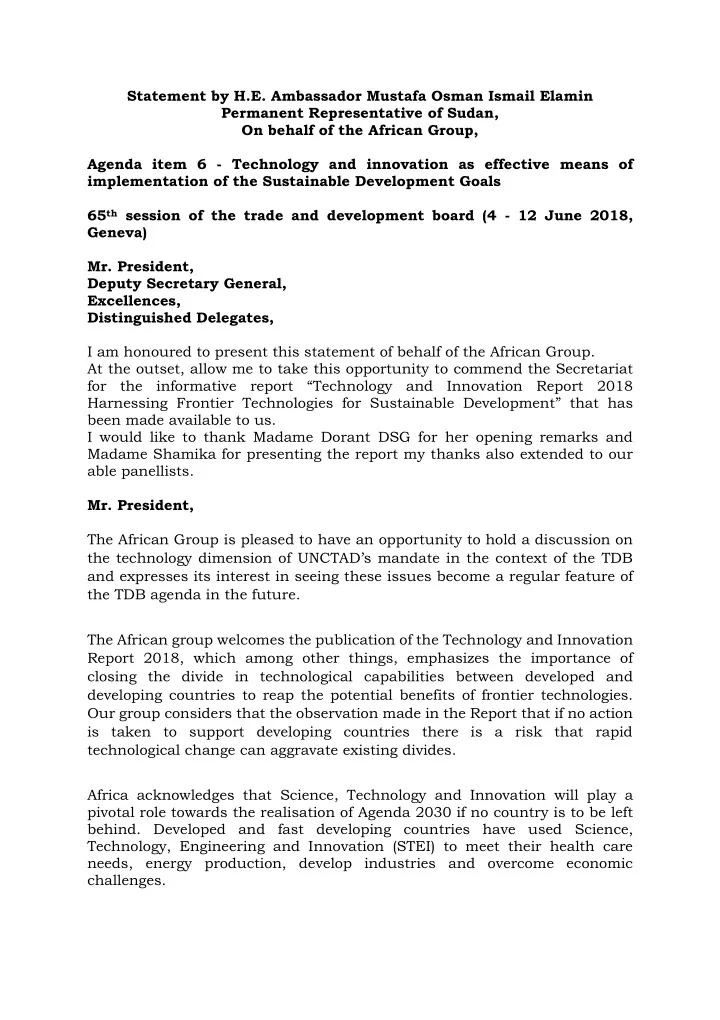

Statement by H.E. Ambassador Mustafa Osman Ismail Elamin Permanent Representative of Sudan, On behalf of the African Group, Agenda item 6 - Technology and innovation as effective means of implementation of the Sustainable Development Goals 65 th session of the trade and development board (4 - 12 June 2018, Geneva) Mr. President, Deputy Secretary General, Excellences, Distinguished Delegates, I am honoured to present this statement of behalf of the African Group. At the outset, allow me to take this opportunity to commend the Secretariat for the informative report “ Technology and Innovation Report 2018 Harnessing Frontier Technologies for Sustainable Development ” that has been made available to us. I would like to thank Madame Dorant DSG for her opening remarks and Madame Shamika for presenting the report my thanks also extended to our able panellists. Mr. President, The African Group is pleased to have an opportunity to hold a discussion on the technology dimension of UNCTAD’s mandate in t he context of the TDB and expresses its interest in seeing these issues become a regular feature of the TDB agenda in the future. The African group welcomes the publication of the Technology and Innovation Report 2018, which among other things, emphasizes the importance of closing the divide in technological capabilities between developed and developing countries to reap the potential benefits of frontier technologies. Our group considers that the observation made in the Report that if no action is taken to support developing countries there is a risk that rapid technological change can aggravate existing divides. Africa acknowledges that Science, Technology and Innovation will play a pivotal role towards the realisation of Agenda 2030 if no country is to be left behind. Developed and fast developing countries have used Science, Technology, Engineering and Innovation (STEI) to meet their health care needs, energy production, develop industries and overcome economic challenges.
Today, the continent witnesses though in a limited proportion the use of Big data analysis to effectively respond to epidemic outbreak; gene editing in controlling the spread of malaria by female anopheles mosquitoes through specific target spraying and production of new resistant seeds and crops to boost agricultural production, internet of things and affordable satellite technology which has allowed farmers to monitor soil conditions and determine rainfall reliability respectively hence, determining the best planting time, provision of improved health services and preservation of agricultural products through the use of biomedical and Nano technology respectively, as well as renewable energy production, to mention but a few. I would like to single out financial inclusion prescribed by the mobile telephony which has penetrated rural areas in sub-Saharan Africa as a key result area for promoting exchange of goods, services and information that ultimately enhances implementation of Agenda 2030. Mr. President, The Technology and Innovative Report highlights several gaps/challenges which I won’t state here to avoid repetition, that require mitigation to facilitate harnessing of frontier technologies and that is if, we, as a whole, are determined to promote equality and inclusive growth. The answer to altering this status quo lies in SDG 17-Partnerships for the goals and specifically, the target on technology and capacity building. In this regard, we encourage developed that have advanced in this sector as well as the international community at large, to provide a platform for the promotion of technology transfer, capacity building, sharing of experiences and structural transformation policies that will propel African economies to grow from not only being technology consumers but developers as well. The launch of the Technology Bank for LDCs, early this week is timely intervention and Africa is optimistic about its output. Subsequently, we encourage able Member States to voluntarily support its cause. Mr. President, Going forward, and in agreement, with the conclusions in this report, it is incumbent on the African economies to put in place robust measures to incentivise and support the desired structural transformation for take-off. Many of them have since embarked on: Integrating Science, Technology and Innovation policies within their National Development Plans and Visions; creation of an enabling environment for innovation with the development of intellectual property promotion; institutionalising appropriate legal and regulatory framework; promoting the use of ICT in public service, social sectors and skills developments including vocational skills training, compilation of a comprehensive National Innovations Inventory to enhance innovation and development of products that facilitate national transformation and development, establishment of innovation fund, strengthening of global partnership for technology transfer and sharing of experiences amongst others.
I would like to end on commendable note by thanking UNCTAD and UN Commission for Science and Technology for Development for continuously providing a platform for policy dialogue, experience sharing and more importantly for the support extended to number of developing countries in the due course of conducting their respective STIP reviews, placing STI and its associated cross cutting nature at the centre of their National Development Plans towards the realisation of the Agenda 2030. I thank you.
Recommend
More recommend